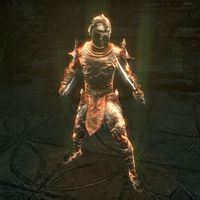| Mane Zebiden-jo | |||
|---|---|---|---|
 Mane Zebiden-jo
Mane Zebiden-jo |
|||
| Race | Khajiit | Gender | Male |
| Born | 2nd Era |
||
| Died | 2nd Era |
||
| Resided in | Elsweyr | ||
| Reign | 2E 182- |
||
| Appears in | ESO | ||
Zebiden-jo (or Zibbiden-jo)[1] was the Mane of the Khajiiti people during the early Second Era, before the unification of the Sixteen Kingdoms. Little is known about Zebiden-jo's life. It is known, however, that he faced one of his parent's spirit and Argonian soul reavers during his trials to become the Mane circa 2E 182. The trials reflected the challenges faced before their ascension.[1]
He died at some point before the unification of Elsweyr and formation of the Elsweyr Confederacy in 2E 309. His remains are preserved in the Tomb of the Manes in Rimmen Necropolis, a huge tomb complex located southwest of the Rimmen itself. He was buried together with other prominent Manes: Jinninji-ri and Tullar-dra.[2] His spirit's rest was briefly interrupted in 2E 582 when The Vestige escorted the remains of the ancient Khajiiti ruler Jora-ri to the burial chamber in the Tomb of the Manes.[3][4]
GalleryEdit
NotesEdit
- Although Rid-Thar-ri'Datta was dubbed the First Mane there were numerous Manes, Zebiden-jo among them, who lived chronologically before him.[5] Lawrence Schick stated that it could be "transcription error, but that would invalidate all these lovely theories" and as such refused to confirm that notion.[UOL 1] Founding date of the Pridehome in the late First Era further confirms existence of Manes prior to the ascension of Rid-Thar-ri'Datta.[6]
ReferencesEdit
- ^ a b Shazah's dialogue in ESO
- ^ Zebiden-jo in ESO: Elsweyr
- ^ Events of Relatively Speaking in ESO: Elsweyr
- ^ Jora-ri's dialogue in ESO: Elsweyr
- ^ Mane Jinninji-ri and Mane Zebiden-jo, who both held the title before Rid-Thar-ri'Datta
- ^ Doomstone Keep loading screen text in ESO: Dragonhold
Note: The following references are considered to be unofficial sources. They are included to round off this article and may not be authoritative or conclusive.